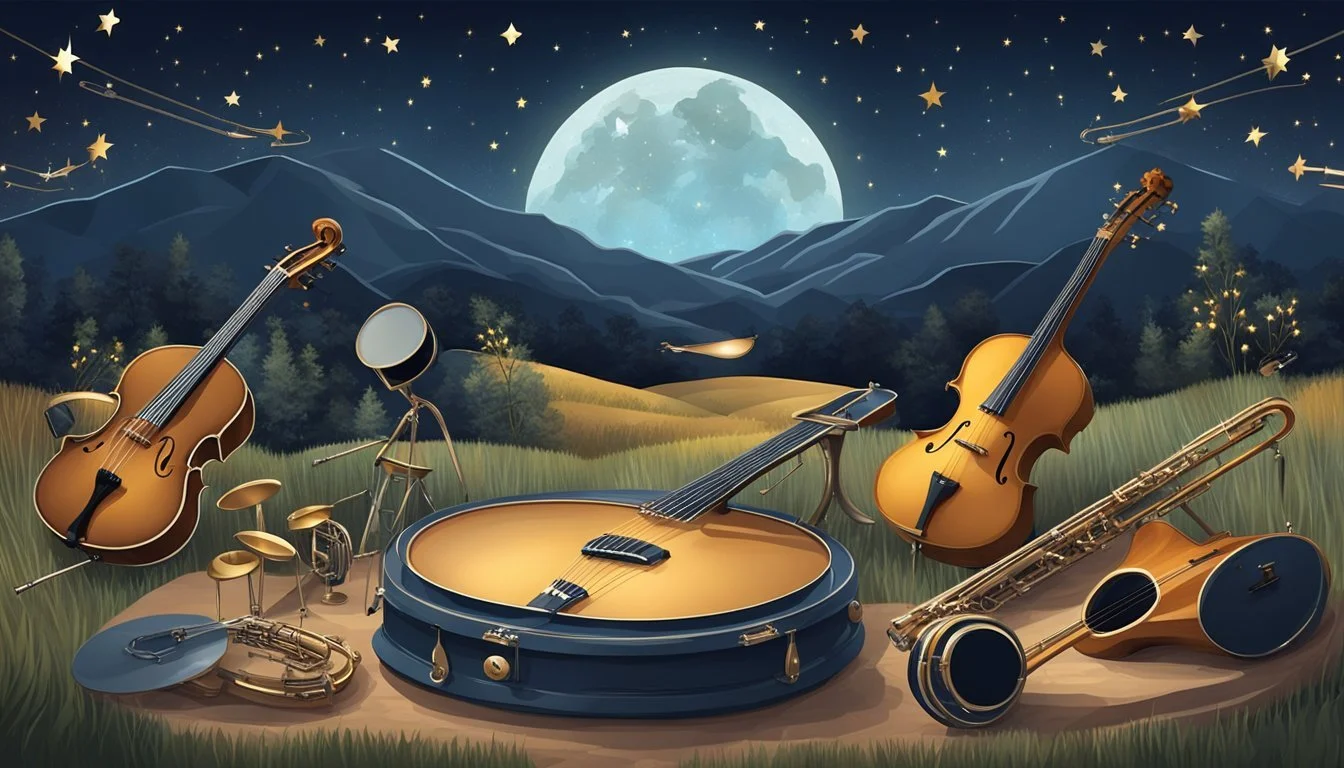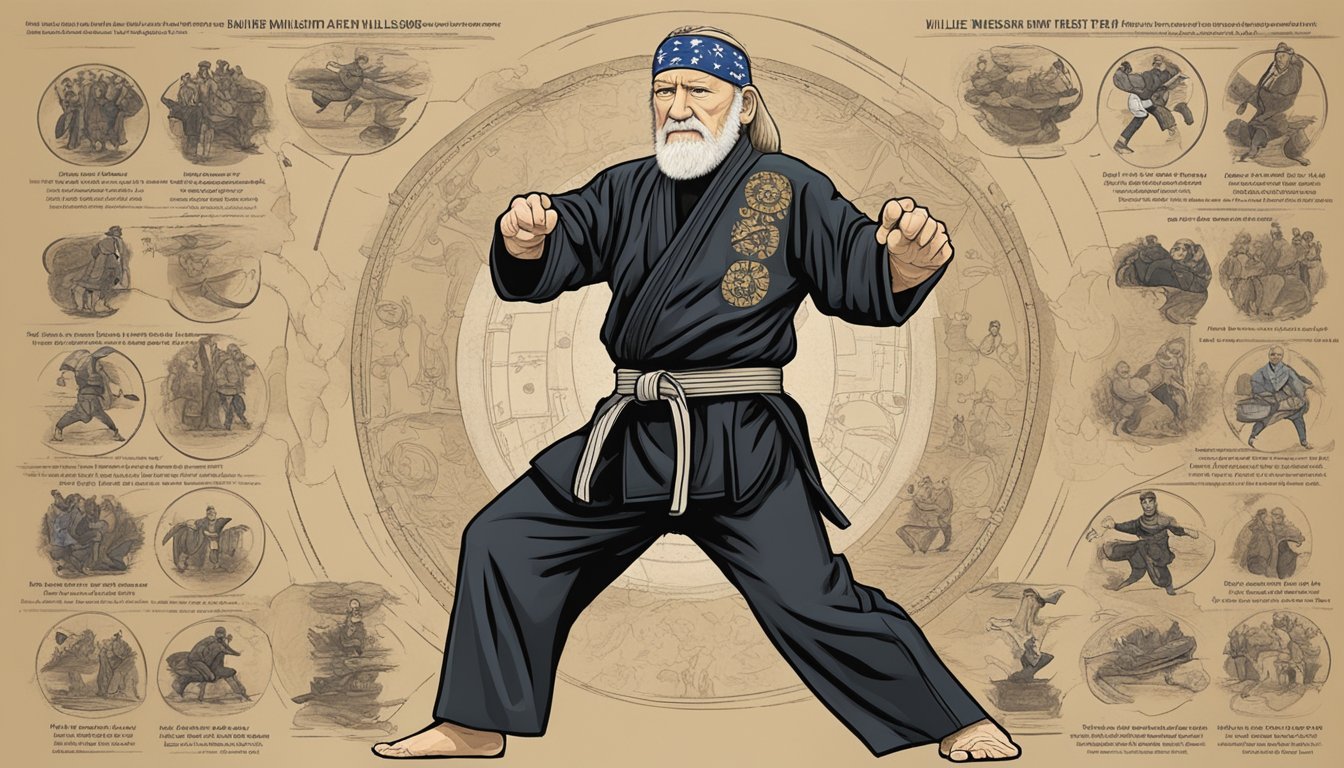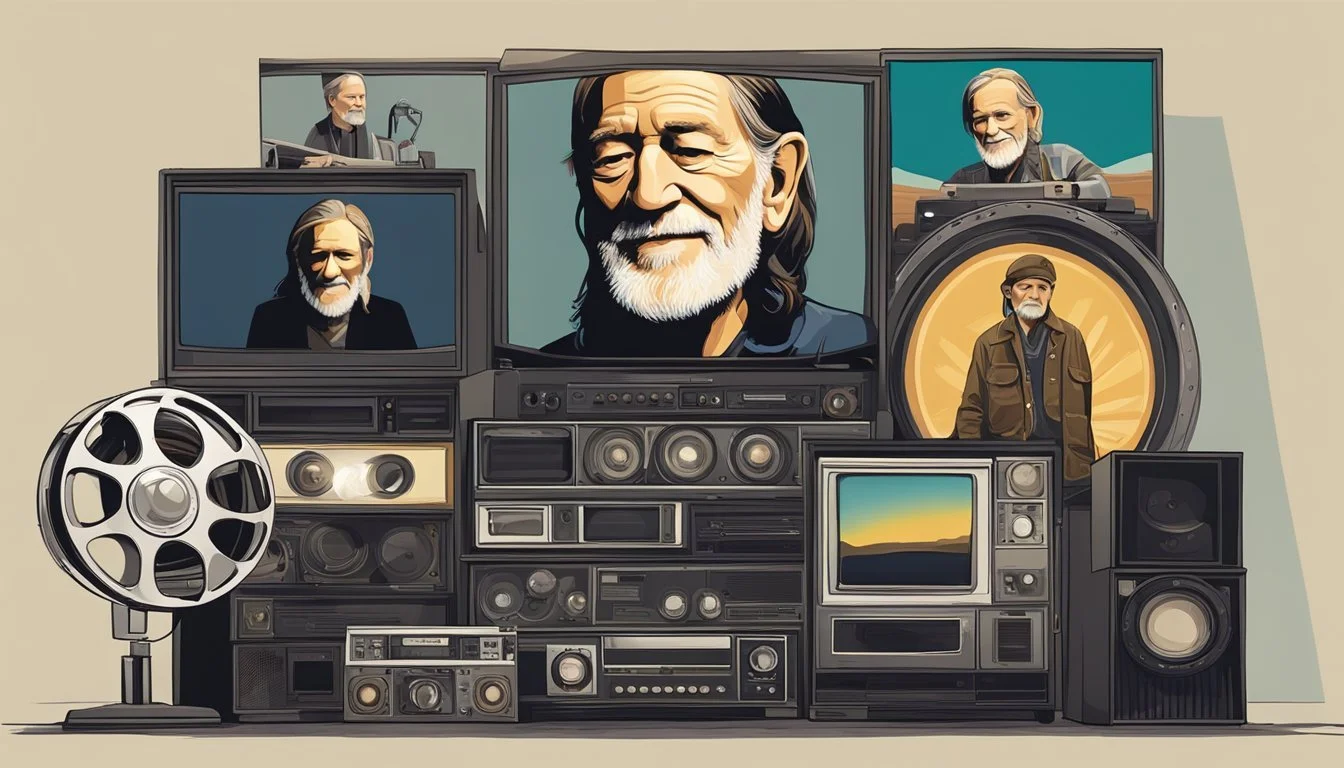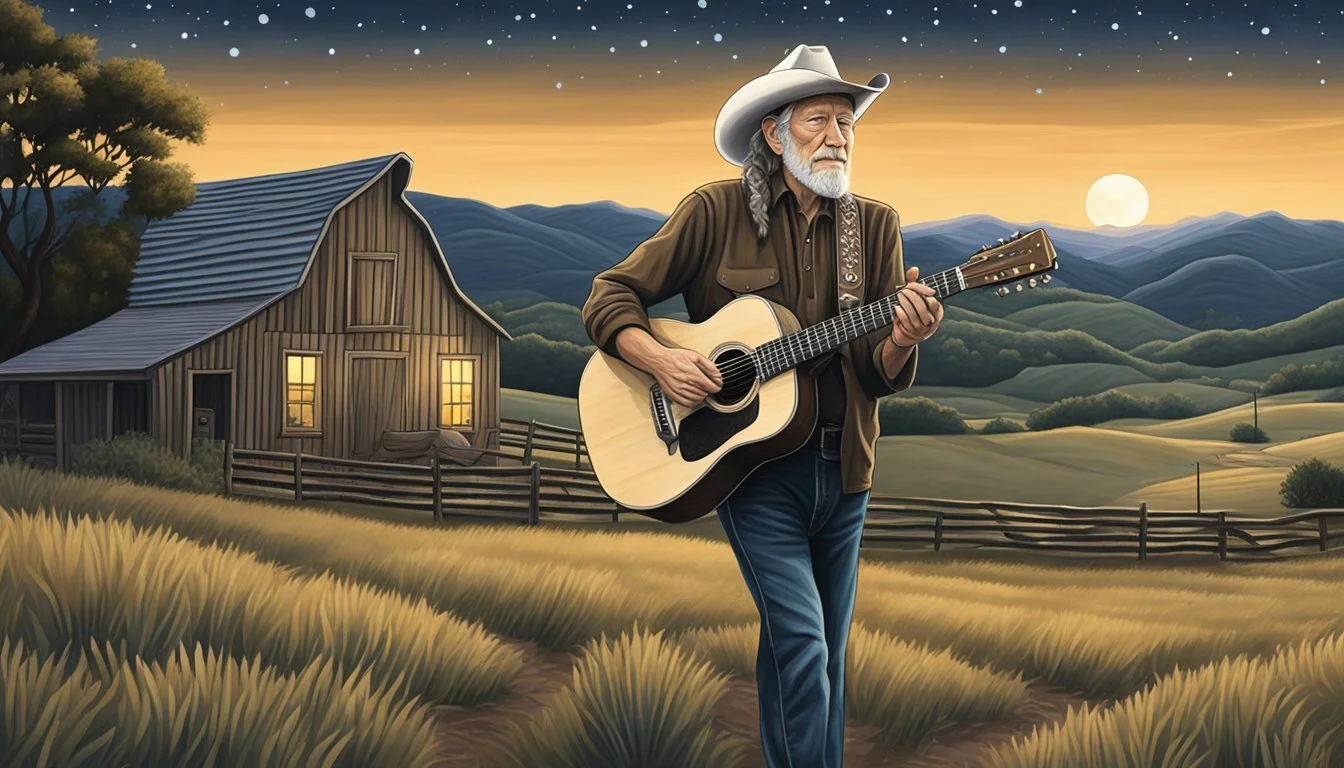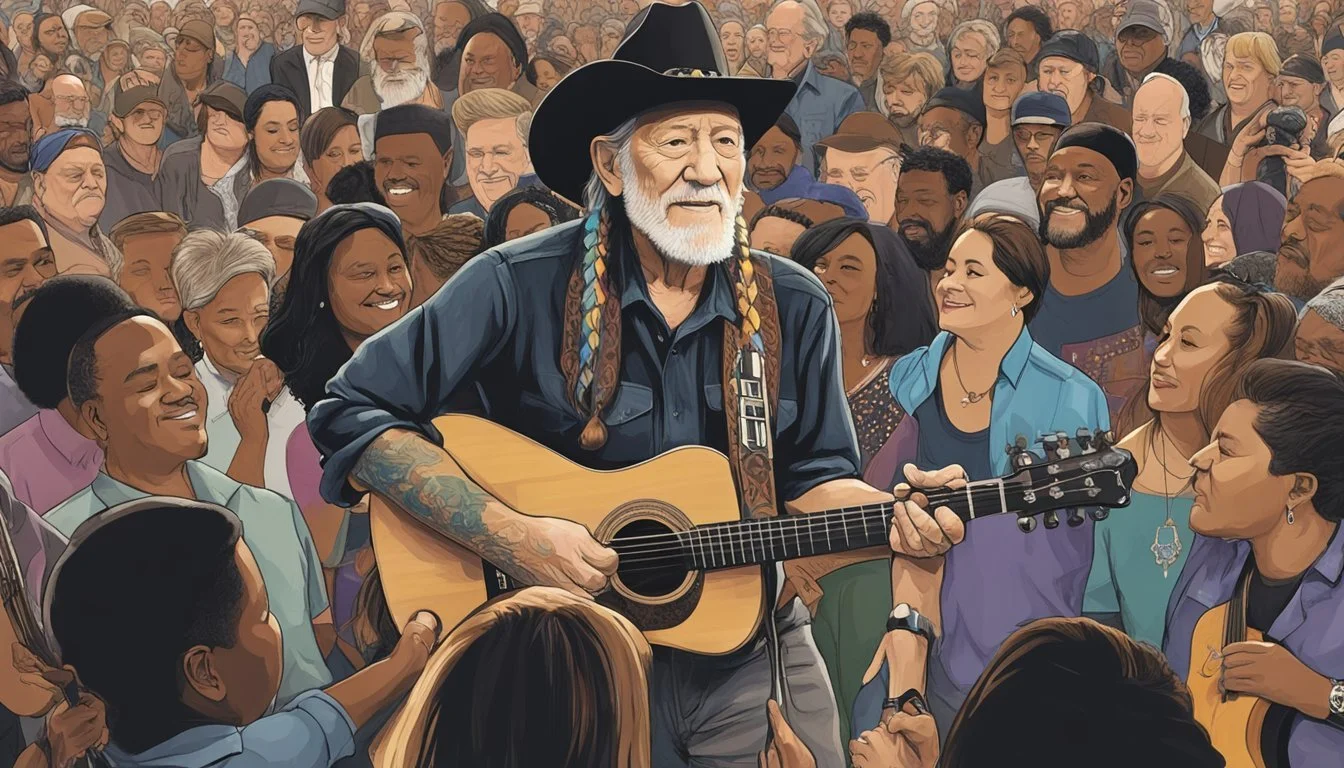10 Surprising Facts You Didn't Know About Willie Nelson & Family
Unveiling the Red Headed Stranger's Hidden History
Willie Nelson's long and storied career has captivated music fans for decades. The country music icon's life and experiences are now chronicled in the new Paramount+ docuseries "Willie Nelson & Family," offering viewers an intimate look at the man behind the legend.
The four-part documentary series reveals surprising facts and lesser-known aspects of Willie Nelson's personal and professional life. From his early struggles to his rise to fame and the challenges he faced along the way, the series paints a comprehensive picture of the artist's journey. Fans and newcomers alike will find intriguing details about Nelson's relationships, musical innovations, and enduring impact on American culture.
1) Willie Nelson recorded over 200 albums
Willie Nelson's prolific musical career spans several decades, resulting in an astonishing discography. The country music legend has released over 200 albums throughout his lifetime, showcasing his incredible productivity and artistic range.
Nelson's extensive catalog covers various genres beyond traditional country music. He has explored western swing, bluegrass, gospel, jazz, and even orchestral compositions. This diverse body of work demonstrates his versatility as an artist and songwriter.
His album releases include studio recordings, live performances, collaborations, and tribute albums. Nelson's dedication to his craft is evident in the sheer volume of music he has produced, averaging multiple album releases per year throughout his career.
This remarkable output has solidified Willie Nelson's status as one of the most prolific recording artists in music history. His vast discography continues to grow, with new releases still emerging even in his later years.
2) He is a second-degree black belt in GongKwon Yusul
Willie Nelson, known primarily for his musical talents, has another impressive skill under his belt. The country music legend holds a second-degree black belt in GongKwon Yusul, a Korean martial art.
Nelson's interest in martial arts began in the 1980s when he started training in Tae Kwon Do. Over the years, he expanded his practice to include other disciplines.
GongKwon Yusul is a relatively modern martial art that combines elements from various fighting styles. It emphasizes practical self-defense techniques and physical fitness.
Nelson's dedication to martial arts demonstrates his commitment to personal growth and physical well-being. This unexpected hobby showcases a different side of the musician's personality.
His achievement in earning a second-degree black belt is noteworthy, especially considering he pursued this discipline later in life. It speaks to Nelson's perseverance and willingness to challenge himself beyond his musical career.
3) Nelson has an honorary doctorate from Berklee College of Music
Willie Nelson received an honorary doctorate from the prestigious Berklee College of Music in 2013. This recognition highlights his significant contributions to the music industry and his influence as an artist.
The honorary degree acknowledges Nelson's exceptional talent and impact on country music and beyond. It also recognizes his role in shaping American music culture over several decades.
Berklee College of Music is renowned for its music education programs and has awarded honorary doctorates to many influential musicians. Nelson's inclusion in this group further solidifies his status as a musical icon.
This honor adds to Nelson's long list of accolades and achievements throughout his career. It demonstrates the respect he has earned from both the music industry and academic institutions.
Nelson's honorary doctorate serves as a testament to his enduring legacy and the lasting impact of his music on generations of artists and listeners.
4) He once smoked marijuana on the roof of the White House
Willie Nelson's rebellious spirit extends beyond his music. During Jimmy Carter's presidency, Nelson visited the White House and reportedly smoked marijuana on its roof.
This bold act has become part of Nelson's legend. He allegedly shared the experience with a member of the Carter family, though details remain unclear.
The incident highlights Nelson's long-standing advocacy for marijuana legalization. It also showcases his reputation for defying conventions, even in the most unexpected places.
Nelson's White House escapade occurred decades ago, but it continues to fascinate fans. It represents a unique intersection of counterculture and politics in American history.
The story has been recounted in various interviews and documentaries about Nelson's life. It remains one of the most talked-about anecdotes in his colorful career.
5) Willie was a co-chair of Farm Aid, raising over $60 million
Willie Nelson co-founded Farm Aid in 1985, an annual benefit concert series aimed at supporting American farmers. The first Farm Aid concert was organized in response to the economic crisis facing family farmers in the United States.
Since its inception, Farm Aid has raised over $60 million to promote a strong and resilient family farm system of agriculture. Nelson, along with fellow musicians John Mellencamp and Neil Young, served as co-chairs of the organization.
The concerts feature performances by a diverse lineup of artists, with Nelson and his family regularly taking the stage. Farm Aid not only raises funds but also increases awareness about the challenges faced by family farmers.
Through his involvement with Farm Aid, Nelson has demonstrated his commitment to rural communities and sustainable agriculture. The organization's impact extends beyond financial support, advocating for policies that benefit small-scale farmers.
Willie Nelson's role in Farm Aid showcases his dedication to causes beyond music, using his platform to address important social and economic issues affecting American agriculture.
6) He wrote his first song at age seven
Willie Nelson's musical journey began remarkably early. At just seven years old, he penned his first song, showcasing a natural talent for songwriting that would define his career.
This early display of creativity foreshadowed Nelson's future as one of country music's most prolific and respected songwriters. His ability to craft lyrics and melodies at such a young age hinted at the artistic prowess that would later produce countless hits.
The exact details of this first song are not widely known, but its existence speaks volumes about Nelson's innate musical abilities. It demonstrates that his passion for music and songwriting was present from childhood.
This early start gave Nelson a significant advantage in developing his craft. By the time he entered the professional music scene, he had already spent years honing his songwriting skills.
7) Nelson has appeared in over 30 films and TV shows
Willie Nelson's talents extend beyond music into the realm of acting. He has graced both the big and small screens in numerous productions over the years.
Nelson's film debut came in 1979 with "The Electric Horseman," starring alongside Robert Redford and Jane Fonda. This role kickstarted his acting career, leading to many more opportunities.
Some of Nelson's notable film appearances include "Honeysuckle Rose" (1980), "Barbarosa" (1982), and "Red Headed Stranger" (1986). He also played himself in popular movies like "Half Baked" (1998) and "Zoolander" (2001).
On television, Nelson has guest-starred in various shows. He appeared in episodes of "Miami Vice," "Dr. Quinn, Medicine Woman," and "Nash Bridges."
Nelson's acting roles often incorporate his musical talents, allowing him to showcase his diverse abilities. His on-screen presence adds authenticity to characters in country music-themed productions.
8) Inducted into the Country Music Hall of Fame in 1993
Willie Nelson achieved a major career milestone in 1993 when he was inducted into the Country Music Hall of Fame. This prestigious honor recognized his significant contributions to the genre over several decades.
The induction ceremony celebrated Nelson's enduring impact as a songwriter, performer, and innovator in country music. It acknowledged his unique vocal style, distinctive guitar playing, and prolific songwriting that produced numerous hits.
Nelson's induction highlighted his role in the outlaw country movement of the 1970s, which helped revitalize the genre. His crossover appeal and collaborations with artists from various musical backgrounds were also noted.
The Hall of Fame recognition came 30 years after Nelson's first major hit as a songwriter. It cemented his status as a legendary figure in country music history.
This accolade added to Nelson's growing list of honors and awards, reflecting his immense influence on American music culture. It remains one of the most significant achievements in his long and storied career.
9) He published a bestselling autobiography titled 'Roll Me Up and Smoke Me When I Die'
Willie Nelson released his autobiography "Roll Me Up and Smoke Me When I Die: Musings from the Road" in 2012. The book quickly gained popularity, reaching the top 10 on the New York Times Best Seller list.
In this memoir, Nelson shares personal stories and reflections on various aspects of his life and career. He covers topics ranging from music and family to politics and his well-known affinity for marijuana.
The book features rare family photographs and artwork created by Willie's son, Micah Nelson. It offers readers a glimpse into the legendary musician's thoughts on his greatest influences and the people who have been important in his life.
"Roll Me Up and Smoke Me When I Die" follows Nelson's previous books, including "The Tao of Willie" and "The Facts of Life: And Other Dirty Jokes." This autobiography provides fans with an intimate look at Willie Nelson's experiences and perspectives.
The book's title references Nelson's song of the same name, showcasing his characteristic humor and laid-back attitude. It captures the essence of Willie's personality and his unique approach to life and music.
10) Willie owns a bio-diesel company called 'Willie Nelson Biodiesel'
Willie Nelson's passion for alternative energy led him to establish Willie Nelson Biodiesel in 2004. The company produces a clean-burning fuel made from vegetable oils, primarily soybeans.
Willie Nelson Biodiesel markets its product under the name "BioWillie." The fuel is designed for use in diesel engines without requiring modifications to the vehicles.
The country music legend's venture into biodiesel reflects his commitment to environmental causes and American farmers. Nelson saw biodiesel as a way to reduce dependence on foreign oil while supporting domestic agriculture.
Willie Nelson Biodiesel initially supplied fuel to truck stops in several states. The company aimed to provide a more eco-friendly option for long-haul truckers and other diesel vehicle owners.
Despite facing challenges in the volatile energy market, Nelson's biodiesel company demonstrated his entrepreneurial spirit and dedication to sustainable practices. It showcased a unique intersection of his musical career and environmental advocacy.
The Early Life of Willie Nelson
Willie Nelson's early years were marked by humble beginnings and musical exploration. His childhood experiences in Abbott, Texas shaped his character and musical sensibilities, setting the foundation for his iconic career.
Family and Roots
Willie Hugh Nelson was born on April 29, 1933, in Abbott, Texas. His parents, Ira and Myrle Nelson, separated shortly after his birth. Willie and his older sister Bobbie were raised by their paternal grandparents, Alfred and Nancy Nelson.
The Nelsons were poor but musically inclined. Willie's grandfather bought him his first guitar at age six and taught him a few chords. By age seven, Willie was writing his own songs.
Growing up in a small farming community during the Great Depression, Willie worked in the cotton fields and absorbed the sounds of gospel music at the local church.
Musical Influences
Willie's early musical education came from a diverse range of sources. He listened to the Grand Ole Opry on the radio, soaking in the sounds of country legends like Hank Williams and Bob Wills.
The blues also played a significant role in shaping Willie's style. He was particularly influenced by Django Reinhardt's guitar playing.
Local musicians in Abbott exposed Willie to various genres. He played his first gigs in local venues as a teenager, honing his skills and developing his unique sound.
Willie's sister Bobbie, a talented pianist, became his lifelong musical collaborator. Their early performances together laid the groundwork for their future musical partnership.
Willie Nelson's Philanthropic Efforts
Willie Nelson has dedicated significant time and resources to charitable causes throughout his career. His philanthropic work focuses on supporting farmers and advocating for animal welfare.
Farm Aid Organization
Willie Nelson co-founded Farm Aid in 1985 to raise awareness about the loss of family farms and promote sustainable agriculture. The organization hosts annual benefit concerts featuring top musical acts. Since its inception, Farm Aid has raised over $60 million to support family farmers and agriculture.
Farm Aid provides resources and grants to farmers in need. It also advocates for policies that protect small farms from corporate takeovers. Nelson remains actively involved as president of the board of directors.
Animal Welfare Initiatives
Willie Nelson is a passionate advocate for animal rights and welfare. He has supported numerous animal protection organizations over the years. In 2008, he rescued over 70 horses from slaughter, providing them sanctuary at his Texas ranch.
Nelson has spoken out against animal cruelty in the food industry. He promotes plant-based diets and has partnered with PETA on various campaigns. His efforts extend to wildlife conservation, supporting initiatives to protect endangered species and preserve natural habitats.

